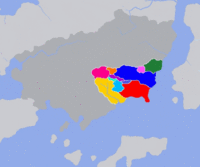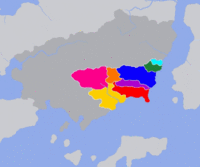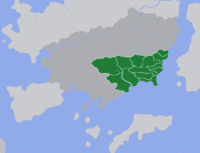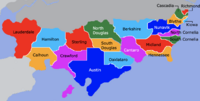Newreath
United States of Newreath Newreath | |
|---|---|
| Motto: "Rising from the ashes" | |
| Anthem: Back Home through country roads | |
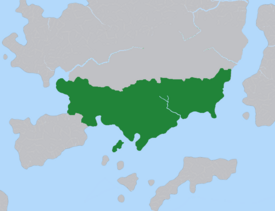 Map of Newreath | |
| Capital | Baxter |
| Largest | Greenwick |
| Official languages | English |
| Recognised national languages | English |
| Ethnic groups | 76.5% White, 13.4% Black, 5.9% Asian, 5.2% Other |
| Demonym(s) | Newreathen |
| Government | Federal, Presidential Democracy |
| George Carter | |
| Andrew Richardson | |
| Laura Roberts | |
| Elliot Russell | |
| Raylan Greene | |
| Federal, Presidential Republic | |
• Acts of Union | 12th March 1821 |
| Population | |
• Estimate | 134,156,864 |
• 2019 census | 133,734,728 |
| HDI | 0.914 very high |
| Currency | Dollar ($) |
| Time zone | CRT (Central Region Time) |
| Date format | dd-mm-yyyy |
| Driving side | right |
| Calling code | +21 |
The United States of Newreath (USN), commonly called the United States (U.S.) or Newreath, is a country consisting of 20 states, a federal capital district and a major self-governing territoriy. Newreath is the largest nation in the region with most of the country located on the central northern continent below Worthington. With an estimated population of over 134 million, the U.S. is the most populous country in the region. The capital is Baxter, located in the Federal Capital District, and the most populous city is Greenwick.
Before unification, the lands that make up what is now Newreath was divided into numerous kingdoms, principalities, grand duchies and republics. The population were predominantly in the east, with the west being sparsely populated due to its mountainous terrain, large forests and the fact that it had not yet been explored. In 1621, 200 years before unification, the largest Kingdoms of Hennessee and Cornelia signed a peace treaty ending centuries of wars between the two nations. Over the course of the next 200 years, revolutions, invasions, annexations and treaties would bring the smaller nations into union with Hennessee and Cornelia. By 1810, only Hennessee and Cornelia remained and after a series of treaties and after growing social demand, the two nations unified at the Congress of States in 1821 in a field just off the eastern coast; a place that would later be named the capital city of the new united nation; Baxter.
Ever since its unification in 1821, the United States has been a military, technological and industrial global power. The US is currently a member-state of the World Assembly and a nuclear-weapons state. A highly developed country, Newreath is one of the region's largest economies and is a hub for business and trade wihth the Greenwick financial district being the national hub for business and trade.
Etymology
The name Newreath is derived from the word 'wreath'. During the years leading up to the Acts of Union, many groups who supported the union used a wreath as a symbol as it represented unity, peace and democracy. Over the years, as the states, which now make up the union, became more pro-union leaning, many adopted the wreath as a component of their flag or as part of their national, provinvial or state symbol. Finally, when the union was proclaimed in 1821, the founding fathers decided that the union's name should incorporate the symbol that had come to represent the pro-union cause. The founding fathers also wanted to incorporate a sense of new beginnings and a dawn of a new nation so combined the words 'new' and 'wreath' to simply form 'Newreath'.
The correct term for a citizen of Newreath is a "Newreathen".
History
In the early 1600s, the land that now makes up the United States of Newreath was dominated by numerous Kingdoms, Principalities, Duchies and Republics. The largest of them were the Kingdoms of Cornelia and Hennessee. The two kingdoms had been at war since the late 1100s and in 1621, came to a peace agreement which saw their borders redrawn and their expansionist gaze to their smaller neighbours. Up until this point, the two kingdoms had been focused on dominating over each other and were forced to dedicate most of their military might to their shared extensive border to prevent invasion from the other. With the peace agreement now signed, the two nations looked elsewhere for expansion. In 1625, under King Edward III, Cornelia invaded the small republic of Nunavik. Nunavik was unable to withstand against the might of Cornelia and sued for peace just 2 weeks after the invasion began. Cornelia annexed Nunavik into its territory and then set its sights on its northern neighbour; the Grand Duchy of Blythe. Blythe was a more formidable opponent and Cornelia had begun the invasion in Winter, when Blythe was notorious for its snow storms. Unable to push into Blythe, the Cornelian armies began to fatigue in the stalemate and in December of 1627, Blythe's armies began the push south into Cornelian lands. Over the next 20 years, the two nations would be locked in conflict with Cornelia making gains into Blythe during the warmer months and Blythe pushing back into Cornelia in the Winter. The war was later called the Tidal War.
At the same time, Hennessee was undergoing major political reform. In 1624, King George II of Hennessee died and was succeeded by his unpopular brother King Henry IV. Henry was a gambler and womaniser who had developed a habit of using his state funding to pay for his bad habits. Upon his ascension to the throne, Henry IV dismissed his late-brother's privy council (advisory body), appointed sycophants to advise him and dissolved the Parliament. In 1628, Henneessee's north-western neighbour, the Confederation of the Cantaro, laid seige to the city of Barrowmere, a former city-state in Cantaro which had been occupied by Hennessee for the last 40 years. Mismanagement of this conflict with Cantaro and the raising of taxes to fund the war and pay for Henry IV's bad habits led to riots breaking out in the capital of Georgia. Henry's harsh reaction to the riots led to further revolts in other cities and towns across Hennessee, and in 1631, army garrissons in the city of Banbury turned against the King and joined the rioters. In 1632, the grand revolution began and Hennessee descended into war. The King and his supporters on one side (the loyalists) and the republican revolutionaries on the other (revolutionaries). The grand revolution lasted 5 years and resulted in a republican victory. Hennessee became a unitary republic with General Wilson, the leader of the republican army, becoming the first president. Henry IV was forced to abdicate and exiled whilst many of his main supporters were executed.
Geography
Climate
Environment
Politics and Government
The United States of Newreath is a representative, federal, presidential democracy. The government is regulated by a system of checks and balances defined in the constitution, which serves as the country's supreme legal document. In February 2020, Newreath ranked 21st in political freedom and 24th in civil rights. The United States of Newreath is also one of the least corrupt nations and has a high economic freedom ranking according to RegStat.
In the Newreathen federalist system, citizens are usually subject to three levels of government: federal, state, and local. The local government's duties are commonly split between county and municipal governments. In almost all cases, executive and legislative officials are elected by a plurality vote of citizens by district. There is no proportional representation at the federal level due to the electoral college and system of appointments and elections for federal officers.
States of the Union
Federalism in Newreath
Newreath is a federal, presidential republic of 20 states and a federal capital district. The states are the principal administrative districts in the country and are further divided into subdivisions of counties. The Federal District of the Capital (FDC) is a federal district that contains the capital of the Newreath, Baxter. The States of Newreath choose the president of the United States, the FDC does not have a say. Each state has presidential electors equal to the number of their representatives and senators in Congress. Citizens registered as citizens in Baxter (FDC) can still cast votes but they effectively mean nothing unless they cast their vote in a state which they hold citizenship in. The presidential electors make up the Electoral College and it was designed to prevent divided government (a situation where congress and the presidency would be held by different parties). However, in modern times, divided governments often occur regardless of the electoral college system.
Citizenship is granted at birth in all states and the Federal District of the Capital.
State Government
The state governments of the states of Newreath are structured in a similar way to that of the federal government. The Governor (chief executive) of each state is directly elected by the citizens of that state. Lieutenant Governors (deputy chief executives) are elected with the governor on a joint ticket; where the nominee for Governor picks their own Lt. Gov. nominee and then the citizens of the state vote for them both together. Governors are elected every 4 years. Cabinet members of state executives are nominated by the Governor and confirmed by the upper houses of the state legislatures, the State Senate.
The State Legislatures (legislative branch) are comprised of an upper house (State Senate) and lower house (State Assembly). State Assembly Members (Members of the Legisative Assembly - MLAs) are elected every 2 years in a first past the post system in districts across the state. State Senators are elected every 6 years in a staggered manor where 1/3rd of the State Senate are elected every 2 years. Districts of State Senators are simply multiple MLA districts combined.
Term limits for Governors, Lt. Governors, State Legislative members and members of the state judicial system are determined by individual states. The States of Hennessee and Lauderdale, for example, do not have term limits for members of the State Legislature or Judicial System but have a 2-term limit on their Governors. The States of Cascadia, Richmond and Blythe have term-limits (of varying length) on all branches of the state government. Some states, such as North Douglas, Austin and Midland have no term-limits for any state officials.


